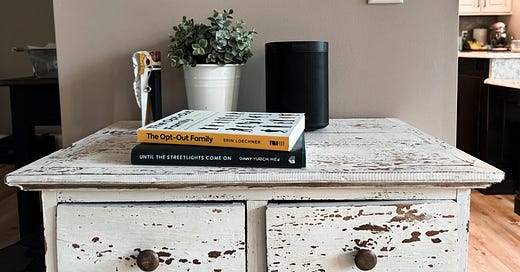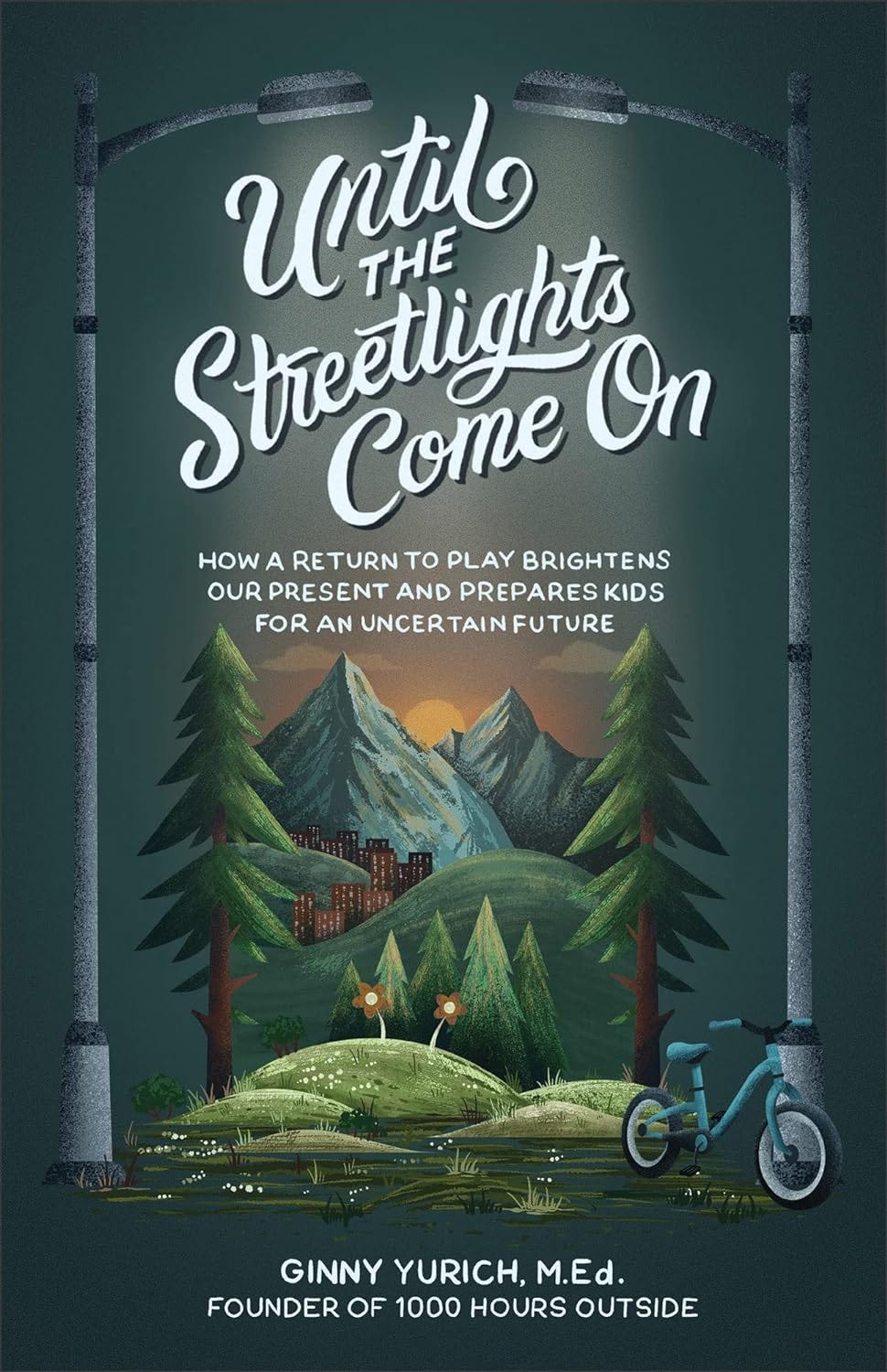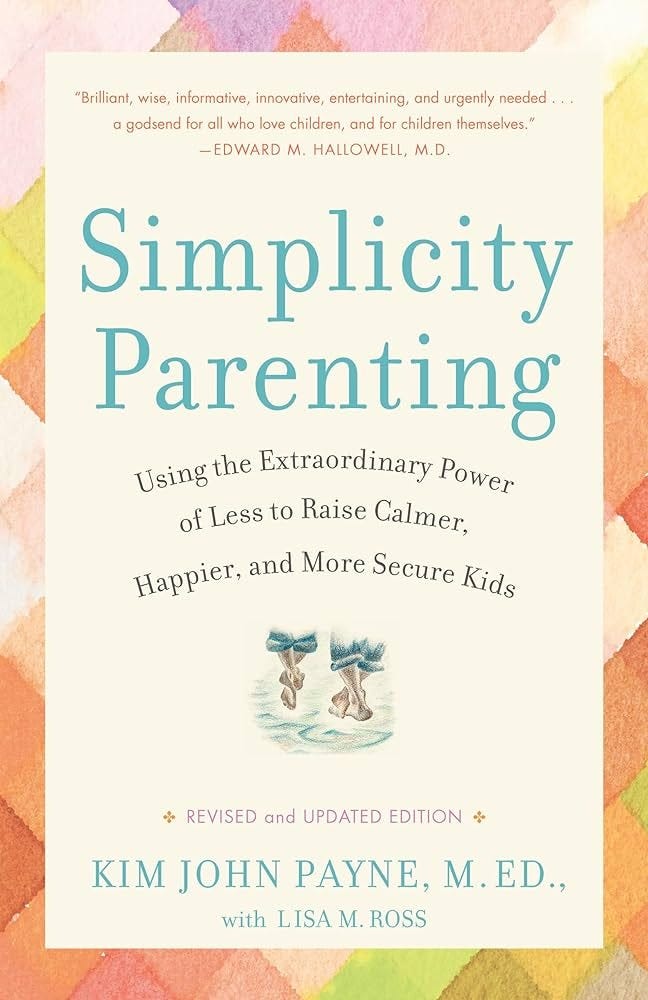This summer I spent less time on my phone as I engaged in reading books about technology, anxiety, raising kids, and the importance of the great outdoors. Entering the teen years with your kids in the age of technology is a serious undertaking. I think all of us parents are looking around at each other, silently screaming, “How do we do this?!?!?” For me, this is where books come in. I value intuition and learning from friends as well, but I’ve always devoured books when desiring to learn about a topic.
The Anxious Generation by Jonathan Haidt
This book was all the buzz in my circles, and so I was excited when my time on the library’s waitlist was up and I could read it myself. It didn’t disappoint! The book states that children’s brains are being rewired, and the two main points of how this is happening are 1. The prevalence of technology, and particularly phones, and 2. The loss of children playing outside. In essence, kids are taking more risks online and less risks in the real world and this is detrimental to their growth.
The Opt-Out Family by Erin Loechner
Erin is a friend of mine in real life, and I love her heart and her passion. She and her family have chosen to go without smartphones and instead value living their lives with low-tech so that they can be present. This book emphasizes the harm of smartphones—not just the active harm from the phone itself but also the passive harm that happens when we are addicted to our devices and miss out on the world in front of us. Erin’s approach is unique in that she views low-tech being important for the whole family and not just children. She sees it as a family decision!
Hunt, Gather, Parent by Michaeleen Doucleff
As I was reading the other books, a friend mentioned this book to me. I hadn’t heard of it before, but it’s the most practical parenting book I’ve ever read. The author visits and learns about other culture’s ways of raising children and implements this wisdom into her own parenting. Some of the practices are very different from western ways of raising children.
Until the Streetlights Come On by Ginny Yurich
Ginny, founder of the 1000 Hours Outside movement, is passionate about getting kids outside. This book emphasizes the importance of unstructured play and the value of sunlight and social play as well as gives examples of how to make outside play more attractive than screen time.
Simplicity Parenting by Kim John Payne
In this book, Payne focuses on simplifying four areas in our kids lives: environment, rhythm, schedules, and filtering out the adult world. He talks a lot about adolescence, and the way the parent-child relationship changes during these years, and I felt really encouraged by these sections.
What Now?
These books came at the right time, as we’re just hitting the teen years. You don’t know what you don’t know as a parent, and often experience is what helps you learn. Particularly with technology, I’ve had to recognize my own mistakes and say, “I’m sorry, but I’m changing my mind. This isn’t working.” [Insert grumpy children and protests…]
After finishing a book, I always ask, “Now what am I going to do with this information?” and I was certainly asking that after reading all of these books this summer.
I’m definitely convinced that taking real-world risks (letting my children play and take part in the real world without as much supervision) is valuable and important, and I also believe the negative consequences of phones for our children can be great. I also believe simplifying our lives and our children’s lives has great value.
It’s so easy for technology to just creep into our children’s lives. When my girls were young, they had nearly a tech-free life. We didn’t have a TV most of the time while they were young, and we had one Kindle that I would take out occasionally for them to play or watch on, and then when it died, I’d put it away for several months until they thought of it again and asked. My girls played outside a lot, too. When they were young, our family was the poster child for what screen-free living looked like. And honestly, it felt really easy back then.
But then as Sophie got older, she liked listening to music. I thought it’d be nice for her to have a device to listen to music on, and iPods are hard to come by like we had back in the day. Also, as a divorced family, I thought it would be nice to have a way to communicate when she is at both parents’ house. Her dad actually got her her first device when she was 10—an iPhone that could only be used when she had wifi. The girls had already shared an iPad at this time, so it seemed like a similar idea, just with a smaller screen, and it was her own.
She has always been an artist, and she loved making animated videos, and I loved that creativity. It was so easy to justify it—listening to music is good. Creating is good. But I realized over time that the time limits I put on didn’t always work correctly, and even when you limit apps, they can find ways around. Monitoring smartphones becomes an exhausting job that takes way too much of a parent’s time. You will never outsmart your kids, either. They were born in this generation.
We have made many changes, but after listening to these books, we’ve gotten serious about what our boundaries and guidelines are around technology, and we’ve implemented more changes.
Some advice I’d give now…
WAIT to give them their own device
UNDERSTAND that they can always find ways around rules and parental controls
KNOW that technology is addictive and a slippery slope—something good can easily become something not good
FIND other parents who are like-minded if possible. You will need the encouragement, but it’s also really helpful for kids to not feel alone with technology limits
When Sophie went to 6th grade at public school, she told me that everyone had a phone. I was certain she was exaggerating. Then on the last day of school, I attended to help with their field day. At the end of the day, the kids were all allowed to take their phones out of their lockers to take pictures with their friends. I kid you not, I found not ONE kid who didn’t have a phone. Every.single.kid had a phone in their hand, and I was looking hard to catch one who didn’t. Kids will definitely feel left out if they don’t have a phone, and the middle school years are hard years to feel ostracized. This is why I really like programs like Wait Until 8th, where parents and kids take pledges with others in their classroom.
Here are changes we have made since reading these books:
We’ve taken away single devices from the younger girls (iPads included). We bought a shared kid safe phone for them to use (we chose Pinwheel) for calls and. texts. This is really nice with co-parenting, but also they are in activities now where they may need to contact us when they’re done, and Brielle is at an age where she can babysit. If they want to watch a show, they can watch it on the tv, and if they want to play a game or Facetime, they can do it on the family computer.
In 8th grade, they can get their own device. Still no social media or youtube or search bar on their phone at this age though (this is a change because we’ve learned through trial and error that these things aren’t healthy for kids). I’m not sure what age we’ll allow social media—maybe at 16, maybe not until they are 18. Because Sophie already has an iPhone, we’re using an app to monitor and limit her phone, since we’ve learned that apple’s parental controls aren’t reliable. They can watch shows on tv and use the family computer for other needs at this age. We started with the Bark app but had a number of issues with it, so we are switching to Norton, but there are many apps available!
Devices are not a gift or a guarantee. At any point, we can take them away or change how we use them if we believe it’s for the best.
No phones in rooms.
Expect more from kids. Hunt, Gather, Parent gave a lot of tips for teaching kids responsibility in the home. One was that kids at an early age want to help but do best in a group setting, so I’ve been asking my younger girls to work with me in folding their clothes… they haven’t complained at all! (My older girls are already responsible for their clothes.) I’ve been trying to simply ask my girls to help me do more, like when I make dinner or to help with the baby. I let Sophie and her friend take a long walk with the dog by themselves.
I’m still walking the parenting path out. I’m sure I’ll need to pivot again in the future. But for now, this is where we’ve landed. Solidarity and gold stickers to all the parents out there in the trenches with me. We were born for such a time as this!










I haven't read the others but Hunt, Gather, Parent really stuck with me! All the practical bits, but also just the idea that this whole parenting/family thing could be really different if we wanted.
I'm picking up the Hunt, Gather, Parent; thanks for the rec! No personal devices for us yet, but I'm sure our time will come... Grateful for an excellent, 1950s esque neighborhood and all the outdoor play that gets shared 🥹